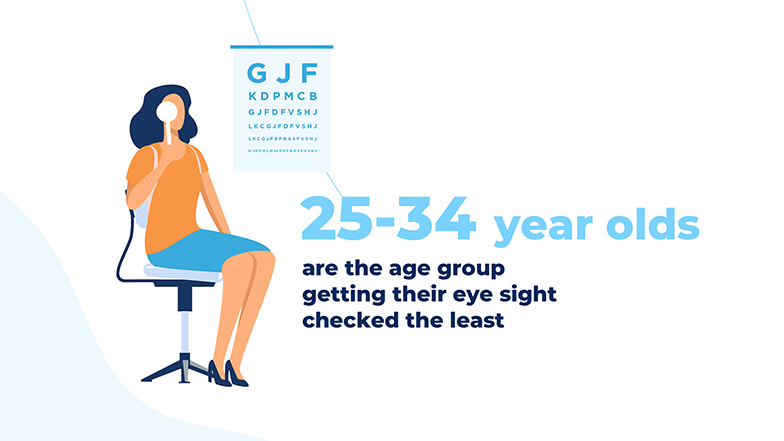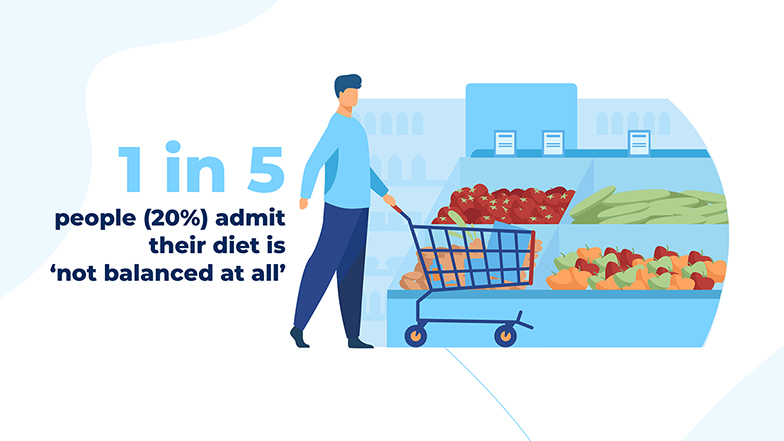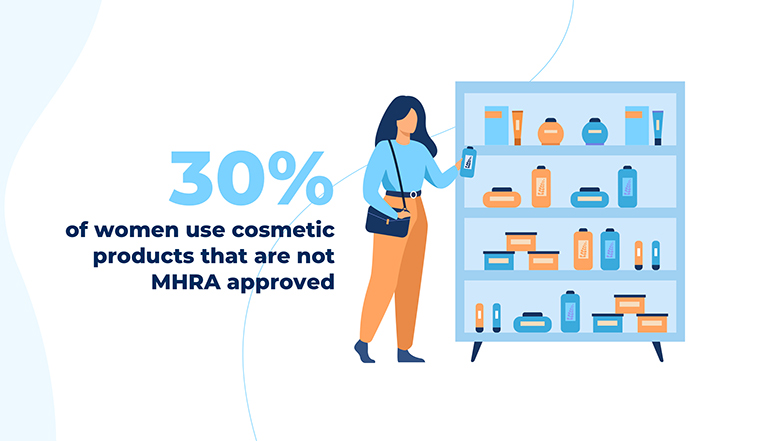Healthy eyesight is one of the greatest gifts we have – but do we all take as much care of our eyes as we should?
To support the launch of our eye conditions hub, we conducted an eye health survey, which was completed by 2,000 individuals, consisting of 20 questions about eye health. The results are quite shocking.
Our eyesight certainly shouldn’t be taken for granted, and the importance of looking after our eyes can’t be understated. Yet, the results of a survey conducted by Guide Dogs revealed that, potentially, too many of us are engaging in bad habits that can cause genuine damage to our eyes – without even realising.
Firstly, 8% of people – rising to 10% of men who answered our survey – revealed that they had never had an eye health test, examination or check up. While this figure may sound reasonably low, it’s still a relatively surprising figure, especially if that’s expected across the UK – that’s a lot of people who have never had their eyes checked or tested.
Eye tests
Shockingly, approximately 5 million people have never had an eye test and a quarter of people surveyed haven’t had an eye test in more than three years. Your eyes rarely hurt when there is something wrong with them which can lead to undetected conditions if not regularly checked by an ophthalmologist. It should go without saying that having regular eye exams is important and such checks go beyond establishing whether you may need to wear glasses; tests can detect any possible eye conditions that might develop in later life, such as cataracts and glaucoma. Not only that, a simple trip to the opticians can also help identify other serious health conditions, like diabetes and high blood pressure, which could lead to an increased chance of a stroke.

25-34 year olds are the age group getting their eye sight checked the least
There are always going to be factors in our lives that prevent us from maintaining regular eye check ups, the most recent being the pandemic. Specsavers reported that in 2020 there was a 4.2 million drop in eye tests delivered and “an estimated 2,986 people have lost vision due to delayed identification and treatment of eye disease; some are experiencing severe sight loss and blindness”. Make no mistake, skipping that routine check-up at the opticians could have consequences for your health; it’s recommended that you have an eye test every two years, at least. If you have any concerns or would like more information on the symptoms and causes of different eye conditions, please visit or eye conditions hub.

Attending regular assessments at your local opticians may benefit both your eye health and general health. Attending the optician every two years, or more frequently if advised by an optometrist, may help to prevent avoidable causes of sight loss. There are various eye conditions that are often picked up by optometrists in the early stages of a disease before the patient notices there is something wrong. For example, patients with the early stages of glaucoma will not have any symptoms until the condition becomes more advanced. Identifying the condition early allows for early assessment by an ophthalmologist and early treatment to avoid sight loss. Regular assessment by an optician may also identify signs of conditions that affect general health, such as diabetes and high blood pressure, that can be flagged up to the patients’ General Practitioner. Diagnosing and treating such conditions early will prevent complications in the eyes that can lead to blindness and help to avoid serious conditions health conditions such as stroke and heart attack.
Dr Louise Christou, Ophthalmology Registrar at the Royal Liverpool and Broadgreen University Hospital NHS Trust

However, besides eye appointment attendance, our survey looked at a number of everyday tasks that could affect the health of our vision. Our survey showed that many of us are engaged in seemingly harmless work and personal habits that could compromise our eye health.
It's no secret that our increased exposure to screens - whether for work or leisure - is putting potential strain on our eyes. Yet, the survey showed that 26% of people spend more than eight hours a day using a screen, while 50% of people surveyed claim to spend between 1-3 hours per day on apps and web pages on their mobile phones.

1 in 5 people (20%) admit their diet is 'not balanced at all'
Screen time and breaks

Prolonged screen time may lead to symptoms such as irritable dry eyes or tearing, eye ache, headache and blurring associated with screen use. There are steps to improve comfort during screen time and to maintain eye health. The frequency of blinking is reduced when concentrating on a screen which may worsen dry eyes. Consciously pausing to fully blink may help with dryness and comfort. Focusing on near objects requires the eye muscles to work. Taking regular breaks to focus on a distant object allows the muscles to relax. Furthermore, wearing the correct strength of glasses helps to avoid unnecessary strain. It is advisable to have your glasses prescription checked regularly by your optician.
Dr Louise Christou, Ophthalmology Registrar at the Royal Liverpool and Broadgreen University Hospital NHS Trust

Spending a lot of time focusing on screens can be damaging to your eye health if not properly checked but there are many different ways that problem can be avoided, one of which is taking regular breaks however a quarter of the people we surveyed admitted to not doing that. People in London are more likely to spend over eight hours at a screen every day compared to the rest of the UK however they are the region that is better at taking regular screen breaks. Only 15% of Londoners admitted they never take screen breaks compared to 33% in Northern Ireland, 31% in Scotland and 29% in the north west.
While we don’t know for certain, there’s a reasonable assumption that some respondents were in both groups, so spending more than eight hours a day using a screen and then at least an hour in addition to that browsing on their mobile phone. Collectively and combined, that’s a lot of eye strain. Every day. With the rise of working from home, this has been something that is out of peoples control in their daily lives but it is important to know what things can be done to prevent eye damage and not cause headaches or sight-related problems. Blue light glasses are one of them, they are glasses that are specially designed to reduce the amount of blue light that reaches the eye. Blue light is one type of colour in the spectrum that makes up visible light, and is commonly associated with digital screens.
Contact lenses
Some 68% of people who answered the survey admitted to wearing their contact lenses to bed, with 37% claiming that they do it every night. The risk? Wearing contact lenses can deprive your cornea of oxygen, and while it’s fine to wear contact lenses in the day for a period of time, keeping them on at night can significantly reduce the amount of oxygen your eyes receive, resulting in red or bloodshot eyes, pain and dry eyes. It also increases your chance of eye infections.
Other poor habits regarding wearing contact lenses include 75% of people (82% male, 64% female), wearing contact lenses in the shower.

Limiting the duration of contact lens wear during the day and avoiding wear during sleep helps to maintain the health of the eye surface. Keeping the eye surface healthy helps to avoid eye infections. Inserting and taking out contact lenses with clean and dry hands as well as avoiding contact lens wear in the shower or while swimming reduces the chance of contact lens-associated eye infections which can be sight-threatening in severe cases.
Dr Louise Christou, Ophthalmology Registrar at the Royal Liverpool and Broadgreen University Hospital NHS Trust

Makeup
There were also some concerning replies around makeup use. 43% of women use eye makeup past its sell-by date; 42% of men said that they have tended to sleep with eye makeup on, with 30% of women agreeing, and 58% of men admit to sharing eye makeup with other people, with 21% of women agreeing.
One in three people use makeup past the sell-by date and one in three admit to sleeping in their eye makeup. Sleeping in eye makeup can have damaging effects and cause irritation to the eyes as products like mascara can get into the eye when you’re asleep. Eye irritation can lead to scratching the cornea making it difficult to maintain good eye health and concentration, therefore it is always a good idea to ensure your makeup is fully removed from your eyes before bed.

30% of women use cosmetic products that are not MHRA approved
Similar to makeup scratching the cornea, leaving contact lenses in too long can cause the same results. People in the north east are the best at taking their contact lenses out before bed (59%) but only one in five in the West Midlands remember to. Contact lenses requires attention to detail to ensure good eye health by taking steps from Specsavers such as:
Not using tap water to store your lenses
Don’t ignore any eye problems or discomfort
Don’t use your lenses for swimming
Don’t wear your lenses when you’re in the shower
Don’t sleep in your lenses
Poor practice with eye makeup could cause eye infections, which, if untreated, can become more serious. Just on a final note, 59% of people included in the survey claimed to never use eye drops for redness/dryness – so often, in the case of suffering from a possible eye issue, too many of us do nothing about it.

Makeup may block the oily glands situated around the eyelashes, preventing the oils from contributing to the tear film which normally helps to maintain a healthy and comfortable eye surface. Makeup particles may scratch or irritate the surface of the eye which may leave the eye susceptible to infection.
Dr Louise Christou, Ophthalmology Registrar at the Royal Liverpool and Broadgreen University Hospital NHS Trust

Eye health is crucial, if you have any concerns or want more information on how to maintain your eyes better, visit our eye conditions hub.
Medically reviewed in March 2022 by Dr Louise Christou, Ophthalmology Registrar at the Royal Liverpool and Broadgreen University Hospital NHS Trust
